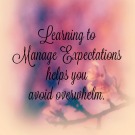Confession: I sometimes struggle to receive offers of help with grace. For a long time, I thought I should be able to do things myself and that asking for help was something only to be done when the world flipped upside down or a major appliance broke.
But over time, I realized my rejection of others when they offered help shut down my ability to nurture relationships and to admit to myself that I didn’t have to have it all figured out. Not accepting wisdom or assistance prevented me from learning what I needed to know in the moment, and what I needed to know about myself.
There are five ways (and certainly many more) to receive with grace that can help us balance our need for self-sufficiency and connection. By understanding each of them, we’re able to maintain our independence and our sense of community.
Everything comes to us that belongs to us if we create the capacity to receive it.
Rabindranath Tagore
Receiving is a Skill
Some people are naturals at reciprocity. They excel at give and take, and can masterfully balance what they can do themselves with knowing when to reach out. Others, like me, can be less comfortable with this balance.
When I shifted my mindset and realized that receiving was a skill that could be learned and nurtured, everything changed. This shift required me to be vulnerable (see more on how vulnerability helps us change HERE) and begin taking more emotional chances. And while this was uncomfortable (and downright squirmy sometimes), I began to understand that I didn’t have to have everything figured out, and often, people were happy to help me.
Understanding that receiving is a skill also required me to become clearer about boundaries; it allowed me to better discern what I needed and what was being “pushed” on me and needed to be declined. I practiced saying “no” in ways that were kind and in alignment with my true needs. I also practiced accepting thanks and compliments and really feeling the feels behind people’s gratitude.
Ask, and You Shall Receive
One of the biggest challenges around comes from believing that if you ask for help, you’re weak. This, and feelings of not good enough, not smart enough, not whatever enough, were at the root of me not being able to receive gracefully. Moving away from guilt, shame, and “not enoughness” were key in helping me learn to ask others for assistance. Viewing that ask as a way to connect allowed me to be vulnerable, practice asking and receiving, and to not take rejection personally (although that part can still sting sometimes.)
Once I began asking for what I needed, I learned to be specific but to not over-justify. Sometimes we tend to over-justify or over-explain and I could feel myself going into a place where I felt whiny or needy when I made my ask. When I stopped over explaining, I was able to focus on what I could learn and how I could also do my part in making things happen. This left me feeling fulfilled and empowered vs. incapable, incompetent, or weak.
Responding to Unsolicited Help
We live in a culture that likes to fix things FAST. We’re bombarded by constant advice, much of it unsolicited. Often, when we’re listening to people, we’re preparing what we’re going to say next, instead of really listening to them. I was (and sometimes still am) this person; I want to help fix things, and sometimes this means I overstep into the area of offering opinions when my opinion isn’t really being asked for.
Receiving feedback from others, especially when you don’t ask for it, is an opportunity to assume the best. Most people aren’t trying to tear you down or sabotage you; they’re trying to share what’s worked for them in the hopes it will work for you too. Along with assuming the best, I also began thanking others for their input, regardless of whether it was useful or not. This wasn’t meant to be dismissive; it was meant to allow them to feel heard and understood. I then took what was valuable from their comments (if anything), and moved on. Not overthinking the others’ input is key; by thanking them and then gleaning what I could use, I practiced receiving with grace, which benefited both parties.
Trust Your Gut When Facing Doubt and Suspicion
As I practiced receiving, I was sometimes confronted by doubt and suspicion. These two feelings would seep into conversations where I felt that if I asked for help, I would then be on the hook to reciprocate in some way, or that the other person had hidden motives for helping me. During these times, it was critical to listen to my gut.
I’m a vibey person, so sometimes I struggle to take things at face value. Along with the tendency to vibe can come the tendency to judge and become suspicious. Because vibeyness and my inner voice are connected, I question myself when I’m suspicious, and if I’m still uncomfortable, I sometimes have a further conversation with the person I’m asking for help.
Handling doubt and suspicion have been the most challenging thing for me to deal with when it comes to receiving. By becoming more self-aware and noticing my vibey tendencies, I’ve been able to notice when I need to slow down, be a little kinder to myself, and figure out how to ask for help with clear expectations.
Embrace Grace and Step into Worthiness
Being able to receive with grace is the ultimate expression of gratitude. When I stopped questioning motives, became truly grateful for what I received, and encouraged the Universe to bring me more of what I needed and wanted, my outlook on giving and receiving changed dramatically.
When you don’t ask for help, it’s often because you don’t feel worthy.
To heal the unworthiness, you must believe you are deserving of
another person’s time, energy, and attention.
As I continue to learn how to receive with grace, I step more fully into a place of knowing that I am worthy of not only asking but also of receiving. Finding comfort and ease in both continues to surprise and support me in ways I could have ever imagined.
Receiving with ease, gratitude, and a sense of grace allows us to maintain both a strong sense of independence and feeling connectivity to others. It asks us to strengthen receiving as a skill, and also to recognize that asking for help is not a weakness, but instead a chance to allow others to give us the gift of their knowledge. By trusting ourselves when we have doubts or suspicion, we learn to establish boundaries and set expectations. Receiving gracefully ultimately asks us to believe in our own self-worth and to know that we are all part of a larger community trying to do the best it can, alone and together.






